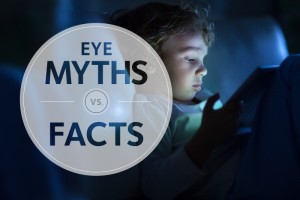We have all heard advice from our parents, other family members, or friends about what to do to maintain or improve our health and lifestyle. You may have heard that eating carrots can improve your vision or wearing glasses all the time makes you dependent on them. But is this really true? Let us take a closer look at some of these myths.
As you get older, your eyes naturally become weaker.
While certain conditions are more commonly seen in the older population, the eye’s anatomy remains relatively stable throughout your lifetime. Cataracts, which are commonly associated with aging, can certainly affect an individual’s vision. However, with the advancements in cataract surgery, cataracts can be addressed very safely according to the individual’s needs.
Other conditions, such as glaucoma, macular degeneration, and diabetic retinopathy, are seen more commonly in individuals over the age of 60. With regular eye exams with an optometrist or ophthalmologist, these conditions can be diagnosed easily and treated appropriately. Early diagnosis and management can often mitigate and prevent any permanent vision loss.
Cataracts need to be “ripe” before they are removed.
Cataracts are the natural clouding of the lens in the eye. They occur as a result of aging and slowly worsen over years as you get older. Diabetes and smoking can certainly accelerate the process of cataract formation. However, there is no known way to prevent their formation.
There is no predetermined time schedule for when cataracts should be removed. Cataract surgery is indicated when it hinders your vision and affects your daily activities, especially reading or driving. A consultation with a cataract surgeon will allow you to understand how cataract surgery can be performed to help your individual needs.
Wearing glasses all the time makes you more dependent on them.
As you get older, your eyes will certainly undergo changes requiring you to wear either prescription or reading glasses. In children and adolescents, prescription changes for glasses or contact lenses are fairly common and should be checked to maintain good quality vision.
In middle-aged individuals, the onset of presbyopia, or the natural loss of the ability of the eye’s lens to change its focus,will make it difficult to see things up close. This natural phenomenon will require you to get reading or bifocal glasses. Presbyopia tends to slowly worsen from the mid-40s until the age of 60. This leads to increasing power for reading glasses or change in bifocal glasses.
Eating carrots will improve your vision.
Maintaining a good diet is important for your general health. However, eating carrots on a regular basis does not lead to improved vision. Carrots contain a high content of beta-carotene. Beta-carotene is converted into vitamin A, which is essential for the normal functioning of the retina, the inner lining of the eye that allows you to see. In the United States, a normal diet contains an adequate amount of vitamin A and does not require the need for any supplements. Individuals with macular degeneration may benefit from the use of specific vitamin supplements to maintain and preserve their vision.
Sitting too close to the TV or reading in dim light will weaken your eyes.
While squinting your eyes can certainly lead to eyestrain, fatigue, and rarely headaches, it does not cause any permanent damage to your eyes. Eyestrain is usually an indication for glasses or a change in your prescription for glasses in children and young to middle-aged adults. In older adults, this may be an early sign of the development of cataracts.
Eye fatigue, especially at the end of the day, can be due to dry eye syndrome. This common condition can easily be treated with the use of over-the-counter drops, specifically artificial tears. Individuals who spend hours working in front of a computer screen can experience fatigue, as they tend not to blink as often. Taking short breaks during the workday can also alleviate these symptoms.

